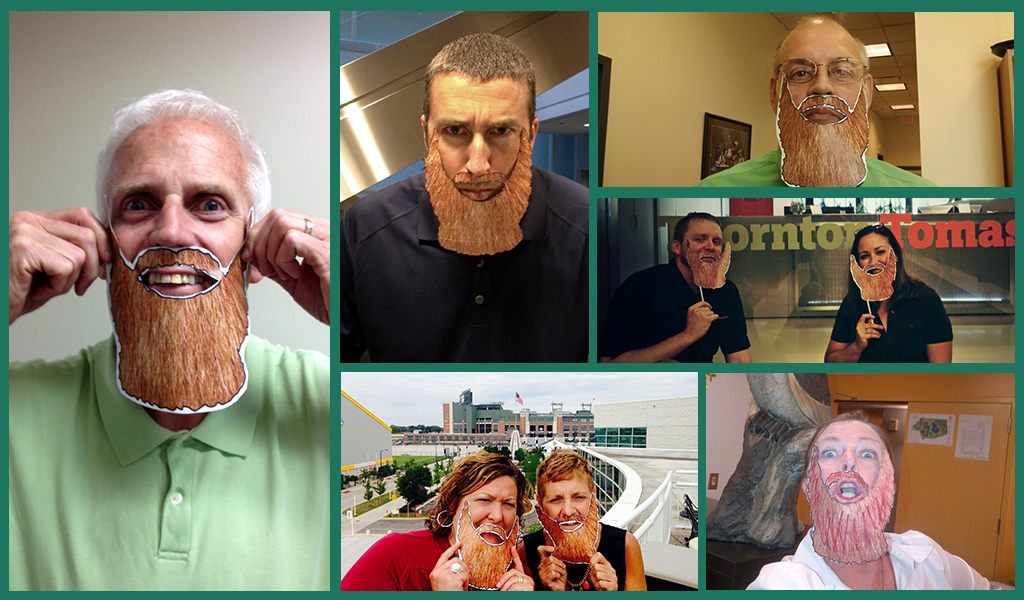Visionary Venues on Customer Relationship Management
Greg Wolfe, IAVM’s professional development manager, recently spoke with Krister Ungerboeck, CEO of Ungerboeck Software International about the session he’s moderating at VenueConnect in Portland.
The panel, “Visionary Venues on Customer Relationship Management,” takes place Monday, July 28, from 10:45-11:30 a.m. Panelists include Randy Brown, CFE, executive vice president and general manager, Allen County War Memorial Coliseum; Allen Johnson, CFE, executive director, Orlando Venues/Amway Center; and Robyn Williams, CFE, executive director, Portland’5 Centers for the Arts.
You can listen to the short podcast below to learn more about the session and Ungerboeck’s thoughts about customer relationship management.
Put a Beard on It!
VenueConnect is just around the corner and excitement is building. By now, you should have received your conference poster. Part of that mailing included a cut-out beard, and we’ve been asking you to send in photos of yourself wearing the beard. We received some pretty great photos from our members, as you can see above.
Please continue to email or tweet us more photos of yourself wearing the beard, and we can pretend to live the dream of the 1890s.
See you soon in Portland!
Samsung and Under Armour May Team Up for Wearables
Samsung Electronics Co. and Under Armour Inc. are expected to partner together as part of move to expand its footprint in the worldwide wearable devices market, reported the Yonhap News Agency in Seoul, South Korea.
“The outlook came as Lee Jay-yong, the de facto heir of Samsung Group, reportedly met Kelvin Plank, the founder and chief executive officer of Under Armour here earlier this month,” Yonhap reported. “During the meeting, they have reportedly discussed ways of countering impact from collaboration between Apple Inc. and Nike Inc. in the wearable devices sector. Such speculations also rose as Lee was witnessed wearing an Under Armour shirt during his visit to the Allen & Company Sun Valley Conference held last week at the U.S. state of Idaho.”
Neither company has confirmed the partnership, and Samsung has already entered the wearable market with the Galaxy Gear smartwatch it released last September. Apple is expected to release its first wearable device later this year, possibly in October. Under Armour entered the wearable market with its own Armour39 system last year.
However this plays out, expect to be awash in wearables by 2018, when spending is expected to reach $19 billion worldwide.
(photo credit: Keoni Cabral via photopin cc)
The Golden Girls’ and Boys’ Room
The Austin City Limits Music Festival is offering something of Willy Wonka magnitude—a golden toilet.
This crowd jewel of portable relief comes equipped with air conditioning, a phone charger, a TV, and so.much.gold.
The Golden Porta Potty will only be available to six winners who receive 10 free potty passes and 10 free single-day tickets to the festival. Be quick, the winners will be announced tomorrow, July 16.
Having my own restroom at event? Now, THAT’S the ultimate guest experience!
More info can be found in the video below, and you can enter at www.aclfestival.com/gpp.
(Image: Austin City Limits Festival. H/T: The Dallas Morning News)
Why Employers Should Hire “Boomerang Employees”
The cost of losing an employee and hiring and training a new one can reach thousands of dollars (various findings in various studies). It makes sense, then, that companies would rehire a former worker in order to offset some of these costs.
Two studies from the University of Illinois focused on these “boomerang employees” and their benefits to organizations.
“In addition to understanding the organizational culture, returning employees might also be more committed to the focal organization upon their return because, in essence, they’ve learned firsthand that the grass isn’t always greener on the other side,” said T. Brad Harris, a professor of labor and employment relations at the University of Illinois.
Harris, and his co-authors—Stacie Furst-Holloway (University of Cincinnati), Benson Rosen (University of North Carolina), and Abbie J. Shipp (Texas Christian University)—found that rehires have several specific experiences.
“After surveying and interviewing hundreds of employees, we were able to see that boomerang employees were more likely to originally leave an organization not because of dissatisfaction with the job, but because of some personal shock, such as a pregnancy, spousal relocation, or an unexpected job offer,” Harris said. “Somewhat unexpectedly, we also found that boomerang employees, compared to non-boomerang employees, typically had shorter original tenures with the focal organizations.”
In Harris’ second study, he found that harmony at the original employer played a key role performance success when rehired.
“Our latest research suggests that organizations should realize that not all boomerangs are created equal,” Harris said. “When evaluating potential boomerang hires, organizations should first, and most obviously, consider their previous performance histories at the focal organization and at their most recent employer.
“Second, organizations should be mindful that employees who originally left on good terms and of their own volition might be better suited for a return than those who left more acrimoniously,” he continued. “And finally, employees who are not gone for very long might possess more of the desirable attributes of boomerang employees, such as accurately recalling the organizational culture and understanding the social norms expected in it.”
How often do you rehire employees? Please let us know in the comments.
(photo credit: Keith Allison via photopin cc)
Do you want to receive a Front Row News weekly digest?
Categories
- Allied (861)
- Architecture (147)
- Arenas (750)
- Career (897)
- Convention Centers (897)
- Education (623)
- Events (1,544)
- Food & Beverage (193)
- Foundation (113)
- Guest Experience (1,497)
- Industry News (2,270)
- Leadership (1,888)
- Marketing (150)
- Membership (2,001)
- Music (213)
- Performing Arts Centers (456)
- Professional Development (409)
- Research (128)
- Safety & Security (442)
- Sports (764)
- Stadiums (611)
- Student (159)
- Technology (516)
- Ticketing (92)
- Touring (82)
- Trends (365)
- Uncategorized (685)
- Universities (218)
- Video (25)
- Young Professional (198)
Twitter Feed
- Twitter feed loading
Recent Posts
- Cobb-Marietta Coliseum & Exhibit Hall Authority Releases 2024 Annual Report
- Hayley Nath Named IAVM’s 2025 Outstanding Volunteer Service Award Winner
- San Diego Convention Center Expands Lactation Support with New Mamava Pods
- Six Named to Omaha Business Hall of Fame, Enshrined in Museum Exhibit
- Welcome to Our Newest Members
Categories
- Allied
- Architecture
- Arenas
- Career
- Convention Centers
- Education
- Events
- Food & Beverage
- Foundation
- Guest Experience
- Industry News
- Leadership
- Marketing
- Membership
- Music
- Performing Arts Centers
- Professional Development
- Research
- Safety & Security
- Sports
- Stadiums
- Student
- Technology
- Ticketing
- Touring
- Trends
- Uncategorized
- Universities
- Video
- Young Professional
Archives
- July 2025
- June 2025
- May 2025
- April 2025
- March 2025
- February 2025
- January 2025
- December 2024
- November 2024
- October 2024
- September 2024
- August 2024
- July 2024
- June 2024
- May 2024
- April 2024
- March 2024
- February 2024
- January 2024
- December 2023
- November 2023
- October 2023
- September 2023
- August 2023
- July 2023
- June 2023
- May 2023
- April 2023
- March 2023
- February 2023
- January 2023
- December 2022
- November 2022
- October 2022
- September 2022
- August 2022
- July 2022
- June 2022
- May 2022
- April 2022
- March 2022
- February 2022
- January 2022
- December 2021
- November 2021
- October 2021
- September 2021
- August 2021
- July 2021
- June 2021
- May 2021
- April 2021
- March 2021
- February 2021
- January 2021
- December 2020
- November 2020
- October 2020
- September 2020
- August 2020
- July 2020
- June 2020
- May 2020
- April 2020
- March 2020
- February 2020
- January 2020
- December 2019
- November 2019
- October 2019
- September 2019
- August 2019
- July 2019
- June 2019
- May 2019
- April 2019
- March 2019
- February 2019
- January 2019
- December 2018
- November 2018
- October 2018
- September 2018
- August 2018
- July 2018
- June 2018
- May 2018
- April 2018
- March 2018
- February 2018
- January 2018
- December 2017
- November 2017
- October 2017
- September 2017
- August 2017
- July 2017
- June 2017
- May 2017
- April 2017
- March 2017
- February 2017
- January 2017
- December 2016
- November 2016
- October 2016
- September 2016
- August 2016
- July 2016
- June 2016
- May 2016
- April 2016
- March 2016
- February 2016
- January 2016
- December 2015
- November 2015
- October 2015
- September 2015
- August 2015
- July 2015
- June 2015
- May 2015
- April 2015
- March 2015
- February 2015
- January 2015
- December 2014
- November 2014
- October 2014
- September 2014
- August 2014
- July 2014
- June 2014
- May 2014
- April 2014
- March 2014
- February 2014
- January 2014
- December 2013
- November 2013
- October 2013
- September 2013
- August 2013
- July 2013
- June 2013
- May 2013
- April 2013
- March 2013
- February 2013
- January 2013
- May 2012
- March 2012
- December 2011
- November 2011
- October 2011
Recent Comments
- Frank Bradshaw, Ph.D., CVE on John Meyer, CVE, a Tireless Advocate of Certification for Venue Professionals, Has Died
- Neil Sulkes on Hilary Hartung, Friend to Many in Venue Marketing, Has Left Us
- Jason Parker, CVE on The Devastation of Hurricane Helene and How We Can Support One Another
- Larry Perkins on Touhey Testifies Against Speculative Ticketing Before Congressional Subcommittee
- Peter Secord on Major Players for Planned Elkhart Amphitheater Were in the Mix at VenueConnect




